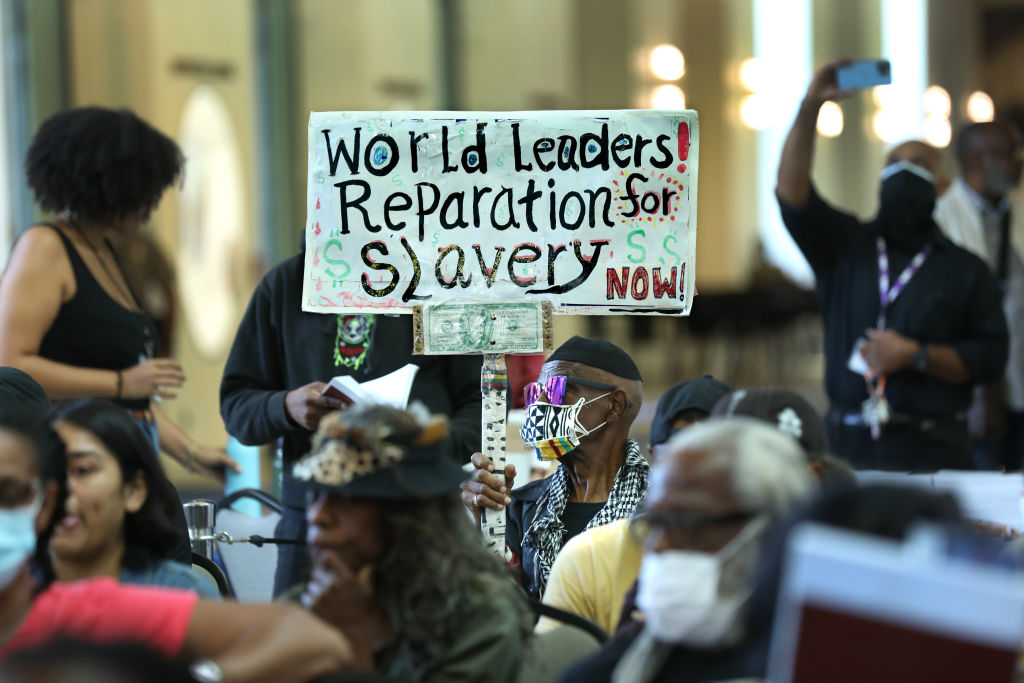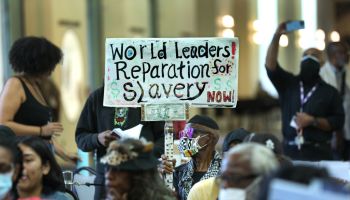
The Reparations Task Force meets to hear public input on reparations at the California Science Center in Los Angeles on Sept. 22, 2022. | Source: Carolyn Cole / Getty
As California’s legislature considers a proposal for reparations for the state’s Black residents, a member of the committee that put together the final report of recommendations has offered some nuanced context as to how its conclusions were reached.
In the final report, reached after two years and submitted on Thursday, the reparations task force detailed decades of discrimination against Black Californians, including voting, housing, education, disproportionate policing and incarceration. It will be up to lawmakers to determine the final monetary amount, but initial projections suggested an $800 billion package that would mean about $125,000 for each eligible recipient, according to the Associated Press.
If approved by Gov. Gavin Newsom, the reparations payments would be limited to Black Californians who are descendants of U.S. slaves. But there are still questions about who is eligible for the prospective reparations, a topic that the leader of the California reparations task force touched on in a recent interview.
Kamilah Moore, the group’s chairperson, said on MSNBC last weekend that the affirmative action case before the U.S. Supreme Court factored into its approach when it came to eligibility for reparations prior to last week’s decision.
After seeking legal consultation specifically about reparations eligibility, Moore said the task force was given a “warning” more than a year ago that the Supreme Court would eliminate affirmative action, which happened on Wednesday — one day before the task force submitted its final report.
Moore told Rev. Al Sharpton on his “PoliticsNation” show that University of California Berkeley School of Law Dean Erwin Chemerinsky suggested the task force “structure our policy recommendations not on race, but on the basis of lineage and the basis of being a descendant of slaves.”
Chemerinsky that doing so would be “the best way to evade what is called strict scrutiny,” or “the highest form of judicial review,” Moore said on Sunday.
The task force gave two recommendations for how eligible individuals could be compensated: cumulative compensation for an eligible class and particular compensation for individuals for provable harms.
Cumulative compensation takes into account community harms such as health disparities, mass incarceration, over-policing and housing discrimination. Particular compensation would require documented evidence of their harm before being eligible for payouts.
One of the first recommendations from the panel is that lawmakers craft an apology on behalf of the state that must “include a censure of the gravest barbarities.” Secondly, the panel recommends a new agency be created specifically to provide services to descendants of enslaved people as well as provide cash payments to those eligible.
Other proposals from the group include declaring Election Day a paid state holiday, restoring voting rights to all formerly and currently incarcerated people and implementing rent caps in historically redlined neighborhoods.
The reparations movement in California has sparked similar efforts in other states around the country. Last month, New York passed a bill to create a commission that will consider reparations for slavery in the state, similar to the task force in California.
A prominent member of a group also advocating on a national level for reparations for slavery for descendants of slaves suggested such state-wide efforts could end up undermining national efforts and would be a way for Congress to avoid having to deal with the topic.
“This push for local reparations has always been a way for relic reparations organizations like NAARC [National African American Reparations Commission] and N’COBRA [National Coalition of Blacks for Reparations in America] to avoid any confrontation with Democrats in Congress who refuse to make reparations a legislative priority,” Yvette Carnell, president of the ADOS Advocacy Foundation, recently told Fox News. “When Democrats in Congress had a majority and the first Black president, they refused to engage the issue of reparations.”
SEE ALSO:
White People Deserve Reparations For Fighting Civil War, GOP Candidate Says
Reverse Reparations: NC Governor Candidate Once Suggested Black People ‘Owe’ For Slavery
The post California Reparations: How Affirmative Action Case Influenced Task Force’s Final Recommendations appeared first on NewsOne.
California Reparations: How Affirmative Action Case Influenced Task Force’s Final Recommendations was originally published on newsone.com















